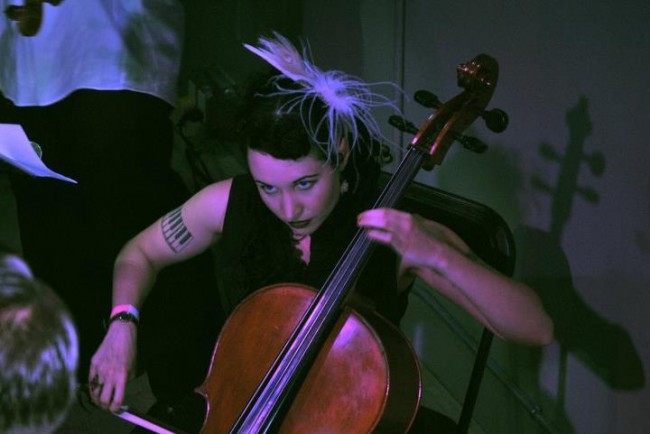“Artistic satisfaction and no day job.”
The topic of digital music is one which carries with it a tremendous amount of baggage, no matter what genre of music you’re talking about. It’s incendiary, it’s controversial, and it makes people hate each other with an unabridged passion when they argue about it long enough. It’s also incredibly interesting, and there’s been an enormous amount of conversation (be it civil or laden with hostility) in the industrial scene. These conversations have given birth to a number of attitudes, one being that digital music – in its essence a delivery medium borne of the junction of technology and convenience – makes it tremendously easier to share/steal music, depending on who you talk to. As a result of this perceived ease of theft, some theorize that it is killing the ability of musicians to be successful.
For the people who make this argument, it would seem, being a successful artist means being able to devote yourself wholly to your art and be able to sustain yourself on the proceeds thereof. This got me thinking about how many artists eschew this definition and are just happy to have enough of their limited edition physical pressings sold off that they can have the corner of their apartment occupied by crates of unsold records back again. It’s exceedingly rare that I’ve spoken to any artist or musician that has declared they won’t be satisfied until their artistic endeavors are bankrolling their lifestyle. This is probably symptomatic of a greater trimming back of expectations as the music industry continues to collapse upon itself and people realize that the model of “make music, get paid, lead gonzo lifestyle” was mostly an unattainable ideal perpetuated by an industry that needed their youthful naivete to oil its gears.

The author, experiencing firsthand the backlash which can accompany any modest success, even feeding the birds. Sorry, Matt, but there was no way we weren't using this picture. -Eds.
Being primarily a DJ, my definition of success is going to be different from that of the serious musician. I’ve had a lot of pretty great experiences, been flown out to a bunch of places, had a lot of opportunities opened to me, met a lot of really fantastic people, and become at least influential enough to keep conversation going in a positive direction about the music I love. In light of this, and the fact that industrial music is a very band-focused genre where DJs necessarily take second billing, I feel that my career as an industrial DJ has been a rousing success. After one brief Facebook debate about the meaning of success for others, I figured it would be interesting to get perspective from some of my music-making friends and see what their own personal meaning of the word is.
Matt Fanale of Caustic
To me the main success I see as a musician (or artist of any sort) means a few things, but first and foremost it means putting out music that people appreciate and that you’re also proud of: after all, just getting an album finished is a major success. In this day and age where it’s increasingly difficult to recoup any investments you make in your music it’s best to keep your sights on what’s actually important: did you achieve what you wanted to and are you happy with it? If the answer is yes, you’re there, and if people enjoy it on top of that you’re a major success.
Success to me can also mean having integrity and believing in your sound and abilities, even if people don’t like it. It means having a relationship with those who listen to your stuff that is based on respect and an understanding that both sides of the relationship have their places for it to be mutually beneficial. We’re a team of sorts, and it’s important that neither of us take the other for granted.
Finally, success to me also means making sure that if a label puts my music out that I push it as hard as I can to ensure that it doesn’t lose money. I take being on a label very seriously, and if someone has the faith in me to put money behind my music I make damned sure I do everything I can to ensure it succeeds financially, even if that means just breaking even.
So there are a few levels to me, but mostly it’s just being able to put music out there and having a positive reaction to it. That’s the most gratifying to me.
Jim Marcus of GoFight & Die Warzau
 In a lot of ways, musicians are luckier than other artists. We have a well-imagined, easy to understand, effective and completable “unit of creation.” The album or CD is a nearly perfect unit. It has a finite number of songs, artwork, a release date. It feels like you know when you are finished. Other art forms don’t have that quite so clearly laid out. As a painter, is one painting okay, or do you need a whole show? How many is a show? What next? Clothing designers have lines, but how many designs in a line and then what? Authors have a book, chapter by chapter, possibly the closest analogue.
In a lot of ways, musicians are luckier than other artists. We have a well-imagined, easy to understand, effective and completable “unit of creation.” The album or CD is a nearly perfect unit. It has a finite number of songs, artwork, a release date. It feels like you know when you are finished. Other art forms don’t have that quite so clearly laid out. As a painter, is one painting okay, or do you need a whole show? How many is a show? What next? Clothing designers have lines, but how many designs in a line and then what? Authors have a book, chapter by chapter, possibly the closest analogue.
Success is something that I have always considered a set of emotional responses. The first part happens when the unit of creation is completed, made and released. This is sometimes the necessary part before I can work on anything else. The next come in “buckets” of emotional energy: when I hear it in the club, when people respond to it, et cetera.
I never think of “success” as one big piece. Some projects deliver it better than others, but if I truly like what I’ve done with the unit of creation it’s possible to feel that feeling of success, regardless of what happens afterward. It’s masturbatory, but it’s there…
Claus Larsen of Leæther Strip
Success for me is when I write a song that teaches me something and takes me one step further to becoming a better and more stable person. Sales numbers have never been a factor in my song writing so that way of working is maybe the main reason I’m still around, still feeling I have something to offer myself and the listeners.
Dan Clark of The Dark Clan
“Artistic satisfaction and no day job.”
That’s how I define being a successful musician. Six words. It’s the glib-and-(hopefully)-quotable version of my answer, to be sure, but there it is. The more considered version is “to be artistically satisfied and make enough money to maintain a comfortable living solely from my music and/or music on which I choose to work.” The terms “artistically satisfied” and “comfortable living” are wildcards, I admit, but that’s beside the point. The point is the definition of “successful.” See why I use the six-word version? Way more quotable. Works much better at parties.
So am I successful by my own definition? No, but I’ve at least got the “artistic satisfaction” part pretty much down; I’m enormously fortunate in that every day I’m working exclusively on music that I find rewarding to be involved with, whether it’s one of my own bands (of which there are several) or the projects of others who honor me by asking me to contribute in some way. Also, every day I get faced with cool and interesting new artistic challenges, so I’m constantly growing and learning as an artist. These are just a couple of the many reasons I feel quite successful on the artistic side of things.
The “no day job” part, though; that’s the tough one. I know it’s a pretty old-fashioned definition of success, but I’m willing to bet it’s the one all musicians keep in their hearts, whether they admit it or not.
Erica Mulkey of Unwoman
 I used to say what I wanted, in order to feel successful, was the ability to go to any major city and play for 300 people. I am nowhere near that, as a headliner. Yet I consider myself fairly successful, finally, after over 10 years of performing as Unwoman. The main components of this are:
I used to say what I wanted, in order to feel successful, was the ability to go to any major city and play for 300 people. I am nowhere near that, as a headliner. Yet I consider myself fairly successful, finally, after over 10 years of performing as Unwoman. The main components of this are:
1) I feel respected artistically
2) I’m making a living doing nothing but the music I want to do, the vast majority of it coming from my solo project, and
3) No one tells me I “have potential” anymore (this is part of #1, but it’s very telling.)
Another thing is that I’ve come to terms with the fact that I’ve never been given permission or encouragement from any record label or major publication, and I’ve continued to do what I do anyway, and it makes me feel stronger to know that all the love and support I get is from actual fans rather than from increasingly obsolete gatekeepers of culture.
“Five new fans at your second show is a huge deal, five more fans at your five hundredth show might mean you need to reevaluate…”
Steven Archer & Donna Lynch of Ego Likeness
Steven: There is a concept in evolution theory called, “The Red Queen.” The Red Queen theory postulates that evolution is driven by creatures putting all their energy into evolving just enough to keep one step ahead of their biggest competition. That is to say, parasites.
Financially, being a working artist is kind of like that. The number of zeros at the end of the checks may change, but ratio of money going out and coming in stays more or less the same.
From a financial stand point, success is anytime you can keep on the positive side of that line. Which sounds obvious and easy, but consider what it takes a business person to accomplish that, much less an artist, who has no training in business, and is focused on creating work that is true to themselves.
On a more personal level, success for me is riding that line while maintaining my own integrity as a creator. It is about being realistic about the return for your sweat equity. That too is a ratio to be adjusted based on where you are in your career. If you are just starting out, and you manage to get anyone who is not your friend to take you seriously, or who likes what you do, that is a pretty huge success. Five new fans at your second show is a huge deal, five more fans at your five hundredth show might mean you need to reevaluate the quality of what you make, or how you make people aware of it.
I see tons of artists who spend a stupid amount of time, trying to either take shortcuts to what they think they want, or overestimate the effect of their work and the size of their fanbase. Those are the ones that spend far too much time being frustrated because they don’t get the kind of response that someone else does. And instead of examining what other people are doing and changing their marketing strategies, they get bitter, and keep punching the same wall over and over, wondering why it hurts.
With the internet, we have access to billions of people. There is a market for everything. But you can’t just sit in your house making things and expect someone to come along and find you. You have to go to them. You have to keep putting what you make out into the world until success finds you. And once that wheel of reciprocity starts spinning, you have to keep it going by building relationships with your fans, and continuing to create work that has substance and meaning.
You also have to maintain perspective and humility, and remember that at the end of the day, after the shows are over and the shirts are sold, you still have to go home, lock yourself in and create work that is sublime and articulate.
Success isn’t about having fans that will buy anything just because you made it.
Success is having fans that are intelligent and buy the things you make, because what you make enriches their lives and has quality.
For me, having that kind of a fanbase, no matter the number, is success.
If you want mindless followers, start a religion.
And artistic success? That comes from believing that what you are doing has validity. If you aren’t doing that, then worrying about any of the above is pointless, because that means all you really want is fame, and if that’s the case, just keep throwing money around, you will get there eventually.
“I don’t go to bed every night wishing I was doing something I love.”
Donna: When I was a teenager I was a classical piano and voice student at Peabody Prep, being primed for the Conservatory and a potential career as an opera singer. One day my voice teacher asked me what I wanted for my future in music. I told her I wanted to be able to travel and be on stage. I didn’t care about getting a degree. I didn’t care about my status in the field. I just wanted to sing, one way or another.
And now I do.
I don’t get rich doing it, but make enough to pay a lot of the bills, so that’s pretty good as far as I’m concerned.
I’ve had people thank me for making music that helps them through bad times, and for inspiring them to create for themselves. My father has told me that no matter how hard it gets, that I should never give up on this path – unless I truly want something different someday – because he gave it up and regrets it every day. And my mother has said to me that I’m one of the most successful people she’s ever known, because I’ve done everything I said I ever wanted to do since I was a little kid.
We need money to live, and that’s fine. I can always make money. I know how to be resourceful. But that won’t mean very much to me – it never has – in the end. What will matter are the experiences I’ve had, the places I’ve been, the things I’ve done, and the things I’ve made. And I get to do all of this with a partner that shares the same dreams and goals.
I don’t go to bed every night *wishing* I was doing something I love, *wishing* I was living life the way I want. So that might be, in the simplest terms, the way I define success, and why, despite status or wealth, I feel I’ve found it.
Brendan Seven of Defcon & Cruciform Injection
 In my humble (or maybe not so humble) opinion, “success” as a musician to any musician is something that meets any one (or more) of three criteria. First, and most obviously (also most likely the most common answer you’ll get from any musician), success is to make a meager (or better) living from your own, personally significant, screaming-your-guts-out music and touring/performance thereof. Based on my current standard of living I’d say anywhere from $30k to millions per anum would make you successful by this measure. I’d put artists like The Raveonettes, Neurosis, Behemoth, and Ghost at the bottom end, and at the top end artists like NIN, Muse, Radiohead, The Cure, U2, etc, into this category. These are people who stick to their guns, and make a living doing it… it’s the ideal outcome of any artistic sojourn.
In my humble (or maybe not so humble) opinion, “success” as a musician to any musician is something that meets any one (or more) of three criteria. First, and most obviously (also most likely the most common answer you’ll get from any musician), success is to make a meager (or better) living from your own, personally significant, screaming-your-guts-out music and touring/performance thereof. Based on my current standard of living I’d say anywhere from $30k to millions per anum would make you successful by this measure. I’d put artists like The Raveonettes, Neurosis, Behemoth, and Ghost at the bottom end, and at the top end artists like NIN, Muse, Radiohead, The Cure, U2, etc, into this category. These are people who stick to their guns, and make a living doing it… it’s the ideal outcome of any artistic sojourn.
Secondly, I would consider any artist that creates/created material that stands the test of time, yet meets little to no critical or commercial success in their own time to be successful. These are tunes that are classics in their own right, that come to be prolific and widespread as the soundtracks of our lives, or equally influential in the definition of a genre. Everything from blues artists like Robert Johnson that wrote tunes like “Sweet Home Chicago” in the 20s – to genre definers like American doom pioneers Pentagram.
“If you are a musician, and you put something out there, and it changes something for someone for the better, I reckon you are successful”
Third, and lastly, sell out bands are successful. Even the top 40 radio rock garbage that makes me puke in my mouth a little and then swallow it. Bands like Avenged Sevenfold, Shinedown, Creed, and Nickelback come to mind. I know there is no way these guys grew up listening to the same Zeppelin and Sabbath records I listened to, and then decided that the garbage they put out sounds good. But you know what? They are millionaires, and they drive Escalades, and they play in rock and roll bands while I scrape by entering the code into the computer to make corporate fat cats rich. Pointing your finger at a band and demonizing them for being “sell outs” is the equivalent to attacking anyone who is successful in any field. A successful person who works in septic tank cleaning may deal with shit all day long… but they are still successful when we all compare paychecks.
So to put it simply – success is measured by whether or not anything actually happens after you put your tunes out, be it financial success, social/political change, or just plain enhancement of the lives of your peers and those around you. If you are a musician, and you put something out there, and it changes something for someone for the better, I reckon you are successful in your own right. Have I achieved this? Well I’ve played internationally and ultimately made a living off of the skills I’ve obtained through music… and even made some money off of music itself. But at the end of the day I still haven’t ever even gotten by from music alone. So until that one year in the future when I stop and realize “Hey… I haven’t worked in a year and all I’ve been doing is rocking out on the guitar… and I’M NOT HOMELESS!” I’ll keep at it with the same attitude.
Josh Fleck of AimOniA/Stardotstar
 Success is kind of a nebulous thing for me; a definition that has dramatically changed over the many years since I first picked up a guitar as a beardless, but much less balding 12 year old. The definition began with the over-the-top fame and riches of the bands I watched on MTV and slowly evolved into the whole “support yourself with your art” farce, before finally settling into my current view. Art for art’s sake. I know that’s a bit of a cliché thing, but it is what it is (oh god, another cliché!). Essentially, I just want to make music I like, occasionally go stomp around on stage, spitting and shouting at whoever is watching and hoping that somebody other than me enjoys it. So far, by that metric, I’ve been successful. Granted, my goals are simple:
Success is kind of a nebulous thing for me; a definition that has dramatically changed over the many years since I first picked up a guitar as a beardless, but much less balding 12 year old. The definition began with the over-the-top fame and riches of the bands I watched on MTV and slowly evolved into the whole “support yourself with your art” farce, before finally settling into my current view. Art for art’s sake. I know that’s a bit of a cliché thing, but it is what it is (oh god, another cliché!). Essentially, I just want to make music I like, occasionally go stomp around on stage, spitting and shouting at whoever is watching and hoping that somebody other than me enjoys it. So far, by that metric, I’ve been successful. Granted, my goals are simple:
1. Create something I can be proud of, and
2. Have fun.
As for #2, I’ve enjoyed great success with that goal, particularly due to the friends I’ve made doing this and we’ve been graced with some really incredible shows to perform at and enjoy. #1 on the other hand is a bit more elusive, but ever-chasing that perfect song is what keeps the machine plodding along. How boring the journey would be if failure wasn’t nipping at your heels!
Thanks a bunch to everyone who contributed. It’s good to see that many musicians still feel that delivering a product that means something is priority number one. The concept of self-sustainability is obvious still on the tips of some musicians’ tongues, and I think the justification for this attitude was eloquently and humbly delivered. Either way, I’m glad that all of you seem to feel that your endeavors as musicians have been qualitatively satisfying, and good luck.
To my readers, tune in next month as I report from the trenches at COLDWAVES: The Jamie Duffy Memorial Concert, where I’ll be spending my time trying to get Chris Connolly to sing “Let’s Get Physical” in the most ridiculously over-the-top Scottish brogue possible. Thanks for reading!





